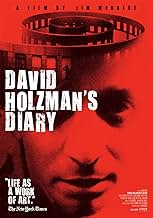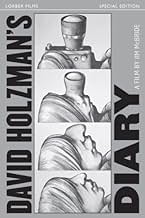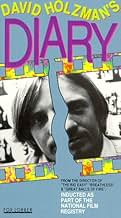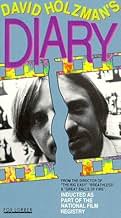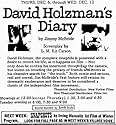- Awards
- 2 wins total
Eileen Dietz
- Penny Wohl
- (as Penny Wohl)
Mike Levine
- Sandra's Boy Friend
- (as Michel Lévine)
Robert Lesser
- Max, Penny's agent
- (as Bob Lesser)
- Director
- Writer
- All cast & crew
- Production, box office & more at IMDbPro
Featured reviews
Wildly unconventional and sadly underrated, "David Holzman's Diary" is, in my opinion, the greatest "found footage" film ever made. While "found footage" is a genre normally associated only with horror movies, and wasn't even a term in 1967, this still plays out extraordinarily similarly to a film like "The Visit" or "Willow Creek". However, it is much, much better and is a tragicomedy rather than a horror flick.
Before delving into the depths of this obscure oddity, one must be aware that it is a highly satirical film. It mocks the avant garde and cinema verite movement in a deadpan and, at times, subtle way. It portrays those who attempted to find art and truth in the painfully mundane as people who are pretentious, delusional, and occasionally creepy. Of course, I am something of a fan of these movements, but it is important to also note that the film isn't mocking ALL cinema verite or experimental films, just the highly pretentious and annoyingly boring ones that began to spring up back in the mid to late 60's.
Although he is something of an antihero, the film also gives poor David Holzman some sympathy as we witness his life steadily decay due to his cinematic obsession. It's tragic, it's satiric, and it's comic.
Before delving into the depths of this obscure oddity, one must be aware that it is a highly satirical film. It mocks the avant garde and cinema verite movement in a deadpan and, at times, subtle way. It portrays those who attempted to find art and truth in the painfully mundane as people who are pretentious, delusional, and occasionally creepy. Of course, I am something of a fan of these movements, but it is important to also note that the film isn't mocking ALL cinema verite or experimental films, just the highly pretentious and annoyingly boring ones that began to spring up back in the mid to late 60's.
Although he is something of an antihero, the film also gives poor David Holzman some sympathy as we witness his life steadily decay due to his cinematic obsession. It's tragic, it's satiric, and it's comic.
What at first seems a fairly straightforward piece of sixties cinema verite turns out to be a precursor to 'The Blair Witch Project' which could easily have been found by the police next to the maker's body and which Maxine Audley might have had in mind when she declared in 'Peeping Tom' "all this filming isn't - healthy!"
I hope the people being filmed through their windows were in on the joke, otherwise the makers would been in serious trouble had they been caught!
I hope the people being filmed through their windows were in on the joke, otherwise the makers would been in serious trouble had they been caught!
Mock cinema vertite about a young filmmakers consternation at finding 'truth' and putting it on film. Insightfully examines how we define reality, how our perceptions can cloud it, and whether it is really possible to show it on film. Probably to talky for most, but still quite thought provoking. Filled with some really offbeat ideas and camerawork. Among them: filming the faces of people at a bus stop while we hear excerpts from the McCarthy hearings. Also photographing a entire night of tv viewing each minute and then playing them back frame by frame. A very low budget movie, made by some very young filmmakers, with a very original point of view.
Kit Carson's face has a relevancy even today, cutting through the demographic piece of the cake: he reminds one of Jean Pierre Leaud which is arguably one of the motives casting him as David Holzman, and he also reminds one of us today Beck's face, and his maybe signature lyric "I'm a loser baby, so why don't you kill me."
But David Holzman as his name says is a man holding - holding what? A camera for sure, the instrument that ultimately makes him fall apart; pursuing his credo stated right at the beginning and maybe, uneasily, hilariously put to the test for the rest of it, that is Jean-Luc Godard's phrase that the cinematic truth runs 24 times a frame. I liked the fact that he rises a bit his voice and somehow overacts his name with an American accent as if it was not far away from jeans, luck, God and art.
I admit I expected something closer to the "I do this, I do that" poetic compositions Frank O'Hara was doing a bit earlier the same period, for he too queered and mocked supposedly avant-guard procedures, or at least their seriousness. I thought David Holzman's self-indulgence slightly needed the more constant alertness he exemplified in scenes like the one in the park, with rows of old people on benches and a dubious voice-over international commentary - that broke away from the rather one-dimensional reaction poor Penny has and seems that she conceives her late boyfriend a simple stupid stalker.
For me the anthology scene is the one with David's friend who talks on camera theorizing about film, in front of a pop mural at his place - and when you think the way the tableau conveys it that you are about to have an illumination on Rosenquist and his tableaux and the American predicament or what, David's friend moves and goes back to the wall resting his head on the crotch on the figure behind. This is great sophisticated camp.
And for me it echoes finely when the end comes with an unexpected intuition on the other side of the pitch: in the end David Holzman says he would not have done it; the 24-times truth seems to him something close to Bartleby territory. "I would prefer not to". Not to do it he says, but this, exactly, seems to me a grim acceptance of the American predicament. What I mean by this is that Bartleby never says "not to do it", nothing comes after his "not to," his denial is a formal gesture without content, that is why his presence is so unbearable. David is not Bartleby but he stumbles upon his presence, perhaps the way Zapruder stumbled upon a President's assassination some years back in his own brand of home cinema verite, and this is what troubles David and makes the film something else than a diary.
But David Holzman as his name says is a man holding - holding what? A camera for sure, the instrument that ultimately makes him fall apart; pursuing his credo stated right at the beginning and maybe, uneasily, hilariously put to the test for the rest of it, that is Jean-Luc Godard's phrase that the cinematic truth runs 24 times a frame. I liked the fact that he rises a bit his voice and somehow overacts his name with an American accent as if it was not far away from jeans, luck, God and art.
I admit I expected something closer to the "I do this, I do that" poetic compositions Frank O'Hara was doing a bit earlier the same period, for he too queered and mocked supposedly avant-guard procedures, or at least their seriousness. I thought David Holzman's self-indulgence slightly needed the more constant alertness he exemplified in scenes like the one in the park, with rows of old people on benches and a dubious voice-over international commentary - that broke away from the rather one-dimensional reaction poor Penny has and seems that she conceives her late boyfriend a simple stupid stalker.
For me the anthology scene is the one with David's friend who talks on camera theorizing about film, in front of a pop mural at his place - and when you think the way the tableau conveys it that you are about to have an illumination on Rosenquist and his tableaux and the American predicament or what, David's friend moves and goes back to the wall resting his head on the crotch on the figure behind. This is great sophisticated camp.
And for me it echoes finely when the end comes with an unexpected intuition on the other side of the pitch: in the end David Holzman says he would not have done it; the 24-times truth seems to him something close to Bartleby territory. "I would prefer not to". Not to do it he says, but this, exactly, seems to me a grim acceptance of the American predicament. What I mean by this is that Bartleby never says "not to do it", nothing comes after his "not to," his denial is a formal gesture without content, that is why his presence is so unbearable. David is not Bartleby but he stumbles upon his presence, perhaps the way Zapruder stumbled upon a President's assassination some years back in his own brand of home cinema verite, and this is what troubles David and makes the film something else than a diary.
I guess you would get confused if you didn't understand the hype and hoopla surrounding the cinema verité movement during this era.
David Holzman's Diary serves to lampoon cinema verité by showing one dull, overly introspective scene after another. It's a thinly-veiled attack on what director Jim McBride saw as a pretentious cinematic form.
The fact that cinema verité is not widely regarded today (except in film schools) is a testimony to how dated this film now appears. That said, Roman Coppola endlessly references this film in his debut, "CQ". Perhaps McBride's film will enjoy a bit of a renaissance.
David Holzman's Diary serves to lampoon cinema verité by showing one dull, overly introspective scene after another. It's a thinly-veiled attack on what director Jim McBride saw as a pretentious cinematic form.
The fact that cinema verité is not widely regarded today (except in film schools) is a testimony to how dated this film now appears. That said, Roman Coppola endlessly references this film in his debut, "CQ". Perhaps McBride's film will enjoy a bit of a renaissance.
Did you know
- TriviaShot on a budget of only $2,500.
- GoofsHolzman shows a montage of TV he says he watched on a Tuesday night in July 1967. He was wrong about the night. Although it's hard to date the Huntley/Brinkley Report newscast or the Joey Bishop Show late-night talk show, neither Batman, Star Trek or the Dean Martin Show aired on a Tuesday night. In July 1967, Batman aired on Wednesday and Thursday nights and Star Trek and the Dean Martin Show aired on Thursday nights. The montage is from a Thursday night.
- Quotes
David Holzman: It was like rooms everything is so perfect, that everything is so perfect that they have to be kept, that because this random particular accidental state so meaningful, so, so touching, it's so touching, it's so beautiful.
- ConnectionsEdited into 365 days, also known as a Year (2019)
- How long is David Holzman's Diary?Powered by Alexa
Details
- Release date
- Country of origin
- Language
- Also known as
- David Holzman's Diary
- Filming locations
- See more company credits at IMDbPro
- Runtime1 hour 14 minutes
- Color
- Sound mix
- Aspect ratio
- 1.37 : 1
Contribute to this page
Suggest an edit or add missing content


